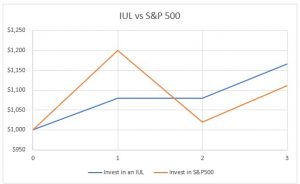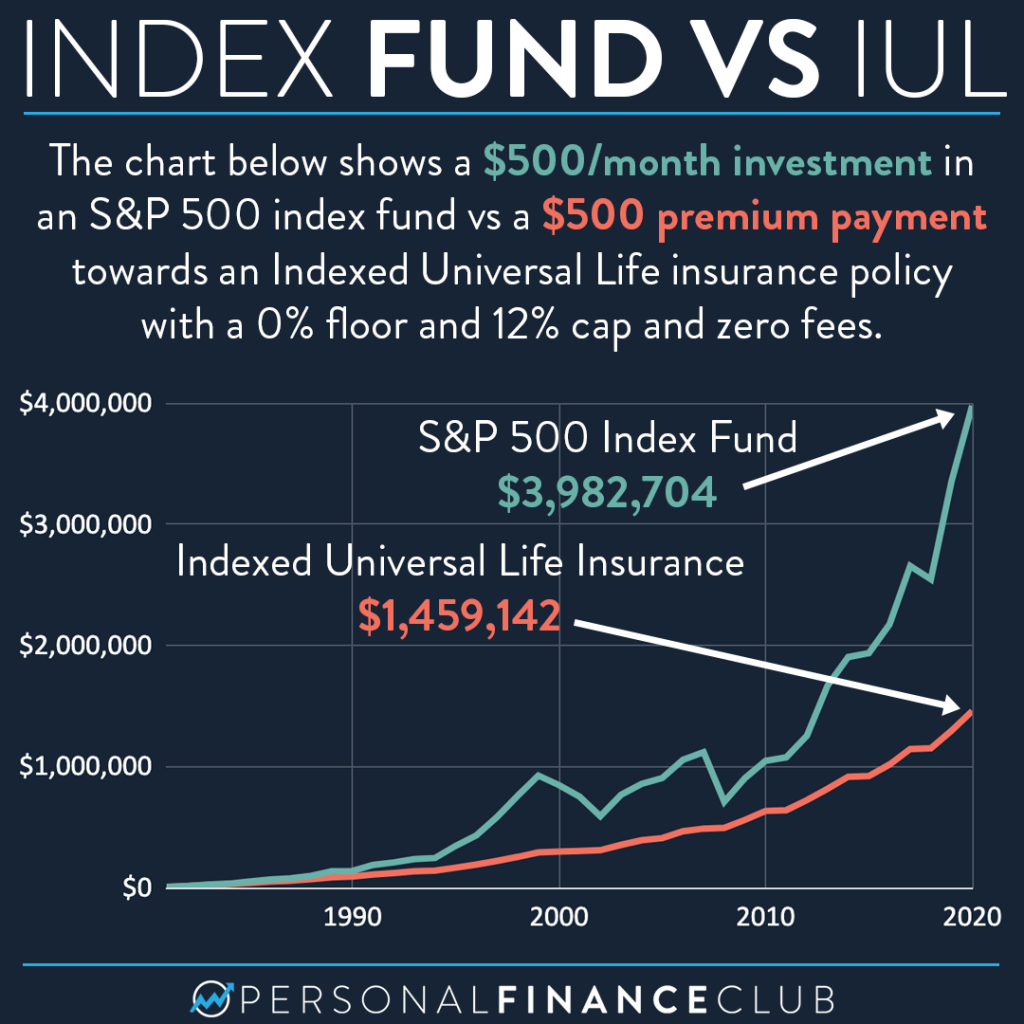All Categories
Featured
Table of Contents
1), usually in an effort to defeat their group standards. This is a straw man debate, and one IUL individuals enjoy to make. Do they compare the IUL to something like the Lead Total Amount Securities Market Fund Admiral Show to no tons, a cost proportion (EMERGENCY ROOM) of 5 basis points, a turnover proportion of 4.3%, and an exceptional tax-efficient record of circulations? No, they compare it to some awful actively taken care of fund with an 8% tons, a 2% ER, an 80% turnover proportion, and a terrible record of temporary funding gain distributions.
Mutual funds usually make yearly taxable circulations to fund proprietors, even when the value of their fund has decreased in value. Shared funds not only need revenue coverage (and the resulting yearly taxes) when the shared fund is going up in worth, yet can additionally impose earnings taxes in a year when the fund has gone down in value.
You can tax-manage the fund, harvesting losses and gains in order to minimize taxed circulations to the financiers, but that isn't somehow going to alter the reported return of the fund. The possession of common funds might need the shared fund proprietor to pay estimated taxes (tax free retirement iul).

IULs are easy to place to make sure that, at the owner's fatality, the recipient is exempt to either earnings or inheritance tax. The exact same tax decrease methods do not function virtually as well with mutual funds. There are numerous, commonly pricey, tax traps connected with the timed purchasing and marketing of common fund shares, catches that do not use to indexed life insurance policy.
Possibilities aren't really high that you're mosting likely to be subject to the AMT because of your shared fund distributions if you aren't without them. The rest of this one is half-truths at best. While it is true that there is no revenue tax obligation due to your successors when they inherit the earnings of your IUL policy, it is likewise real that there is no revenue tax due to your heirs when they acquire a common fund in a taxed account from you.
Life Insurance Cost Index
The federal estate tax exemption limitation mores than $10 Million for a couple, and growing yearly with rising cost of living. It's a non-issue for the vast majority of physicians, much less the rest of America. There are far better methods to stay clear of inheritance tax problems than purchasing financial investments with low returns. Common funds may trigger earnings tax of Social Safety and security benefits.

The growth within the IUL is tax-deferred and may be taken as tax obligation complimentary revenue by means of fundings. The plan owner (vs. the common fund manager) is in control of his or her reportable earnings, therefore enabling them to lower and even get rid of the taxes of their Social Safety and security benefits. This one is excellent.
Right here's another minimal concern. It's true if you acquire a shared fund for say $10 per share prior to the circulation date, and it disperses a $0.50 circulation, you are then going to owe taxes (most likely 7-10 cents per share) although that you have not yet had any type of gains.
Yet in the long run, it's truly concerning the after-tax return, not just how much you pay in tax obligations. You are going to pay even more in taxes by utilizing a taxed account than if you purchase life insurance policy. However you're also probably mosting likely to have even more cash after paying those taxes. The record-keeping requirements for having mutual funds are substantially much more intricate.
With an IUL, one's records are kept by the insurance provider, copies of annual declarations are sent by mail to the proprietor, and distributions (if any type of) are completed and reported at year end. This one is additionally type of silly. Naturally you must maintain your tax obligation records in case of an audit.
Index Whole Life Insurance
All you have to do is push the paper into your tax obligation folder when it turns up in the mail. Hardly a factor to buy life insurance policy. It's like this person has never ever purchased a taxed account or something. Shared funds are commonly component of a decedent's probated estate.
In enhancement, they go through the hold-ups and costs of probate. The earnings of the IUL policy, on the various other hand, is always a non-probate circulation that passes beyond probate directly to one's called beneficiaries, and is therefore not subject to one's posthumous lenders, unwanted public disclosure, or similar delays and prices.
We covered this set under # 7, however just to recap, if you have a taxable mutual fund account, you need to put it in a revocable trust (or also simpler, utilize the Transfer on Death classification) in order to stay clear of probate. Medicaid incompetency and life time income. An IUL can give their owners with a stream of income for their entire life time, despite just how long they live.

This is valuable when organizing one's affairs, and converting possessions to income prior to an assisted living home confinement. Shared funds can not be converted in a similar manner, and are generally considered countable Medicaid assets. This is one more stupid one promoting that bad individuals (you know, the ones that require Medicaid, a federal government program for the inadequate, to spend for their nursing home) must utilize IUL rather than shared funds.
Single Premium Indexed Universal Life Insurance
And life insurance policy looks terrible when compared fairly versus a pension. Second, individuals that have money to buy IUL above and beyond their retired life accounts are going to need to be terrible at managing money in order to ever qualify for Medicaid to pay for their nursing home expenses.
Persistent and incurable illness rider. All policies will enable a proprietor's easy access to money from their policy, commonly waiving any type of abandonment penalties when such individuals experience a significant health problem, require at-home care, or come to be confined to a nursing home. Common funds do not give a comparable waiver when contingent deferred sales costs still apply to a mutual fund account whose proprietor needs to sell some shares to money the prices of such a stay.
Best Iul Life Insurance Companies
You get to pay more for that benefit (motorcyclist) with an insurance policy. What a lot! Indexed universal life insurance policy gives death advantages to the recipients of the IUL proprietors, and neither the owner neither the recipient can ever lose money as a result of a down market. Common funds offer no such assurances or survivor benefit of any kind.
Currently, ask yourself, do you really need or desire a survivor benefit? I certainly don't need one after I get to financial self-reliance. Do I want one? I suppose if it were economical sufficient. Obviously, it isn't affordable. On average, a buyer of life insurance policy spends for the real expense of the life insurance policy benefit, plus the expenses of the plan, plus the earnings of the insurer.
Maximum Funded Life Insurance Contract
I'm not completely certain why Mr. Morais included the entire "you can not lose cash" again here as it was covered rather well in # 1. He just wished to duplicate the most effective selling point for these points I expect. Again, you do not lose small dollars, yet you can lose genuine bucks, as well as face serious chance cost due to low returns.

An indexed global life insurance policy proprietor may exchange their policy for a completely different plan without setting off income taxes. A common fund proprietor can not move funds from one mutual fund firm to an additional without marketing his shares at the previous (therefore setting off a taxed occasion), and repurchasing brand-new shares at the latter, commonly subject to sales fees at both.
While it holds true that you can trade one insurance coverage for another, the factor that individuals do this is that the very first one is such a terrible policy that also after purchasing a new one and undergoing the early, adverse return years, you'll still appear ahead. If they were offered the best policy the initial time, they should not have any type of desire to ever trade it and undergo the very early, adverse return years once again.
Latest Posts
Universal Life Form
Guaranteed Universal Life Insurance Definition
Guaranteed Universal Life Quotes